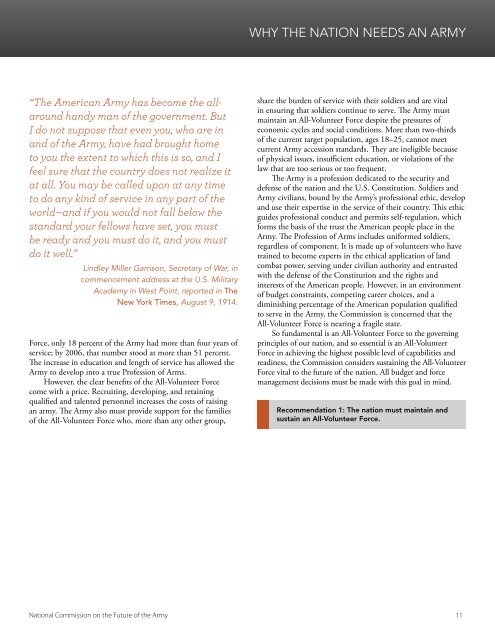THE FUTURE OF THE ARMY
NCFA_Full%20Final%20Report_0
NCFA_Full%20Final%20Report_0
You also want an ePaper? Increase the reach of your titles
YUMPU automatically turns print PDFs into web optimized ePapers that Google loves.
WHY <strong>THE</strong> NATION NEEDS AN <strong>ARMY</strong><br />
“The American Army has become the allaround<br />
handy man of the government. But<br />
I do not suppose that even you, who are in<br />
and of the Army, have had brought home<br />
to you the extent to which this is so, and I<br />
feel sure that the country does not realize it<br />
at all. You may be called upon at any time<br />
to do any kind of service in any part of the<br />
world—and if you would not fall below the<br />
standard your fellows have set, you must<br />
be ready and you must do it, and you must<br />
do it well.”<br />
Lindley Miller Garrison, Secretary of War, in<br />
commencement address at the U.S. Military<br />
Academy in West Point, reported in The<br />
New York Times, August 9, 1914.<br />
Force, only 18 percent of the Army had more than four years of<br />
service; by 2006, that number stood at more than 51 percent.<br />
The increase in education and length of service has allowed the<br />
Army to develop into a true Profession of Arms.<br />
However, the clear benefits of the All-Volunteer Force<br />
come with a price. Recruiting, developing, and retaining<br />
qualified and talented personnel increases the costs of raising<br />
an army. The Army also must provide support for the families<br />
of the All-Volunteer Force who, more than any other group,<br />
share the burden of service with their soldiers and are vital<br />
in ensuring that soldiers continue to serve. The Army must<br />
maintain an All-Volunteer Force despite the pressures of<br />
economic cycles and social conditions. More than two-thirds<br />
of the current target population, ages 18–25, cannot meet<br />
current Army accession standards. They are ineligible because<br />
of physical issues, insufficient education, or violations of the<br />
law that are too serious or too frequent.<br />
The Army is a profession dedicated to the security and<br />
defense of the nation and the U.S. Constitution. Soldiers and<br />
Army civilians, bound by the Army’s professional ethic, develop<br />
and use their expertise in the service of their country. This ethic<br />
guides professional conduct and permits self-regulation, which<br />
forms the basis of the trust the American people place in the<br />
Army. The Profession of Arms includes uniformed soldiers,<br />
regardless of component. It is made up of volunteers who have<br />
trained to become experts in the ethical application of land<br />
combat power, serving under civilian authority and entrusted<br />
with the defense of the Constitution and the rights and<br />
interests of the American people. However, in an environment<br />
of budget constraints, competing career choices, and a<br />
diminishing percentage of the American population qualified<br />
to serve in the Army, the Commission is concerned that the<br />
All-Volunteer Force is nearing a fragile state.<br />
So fundamental is an All-Volunteer Force to the governing<br />
principles of our nation, and so essential is an All-Volunteer<br />
Force in achieving the highest possible level of capabilities and<br />
readiness, the Commission considers sustaining the All-Volunteer<br />
Force vital to the future of the nation. All budget and force<br />
management decisions must be made with this goal in mind.<br />
Recommendation 1: The nation must maintain and<br />
sustain an All-Volunteer Force.<br />
National Commission on the Future of the Army 11


